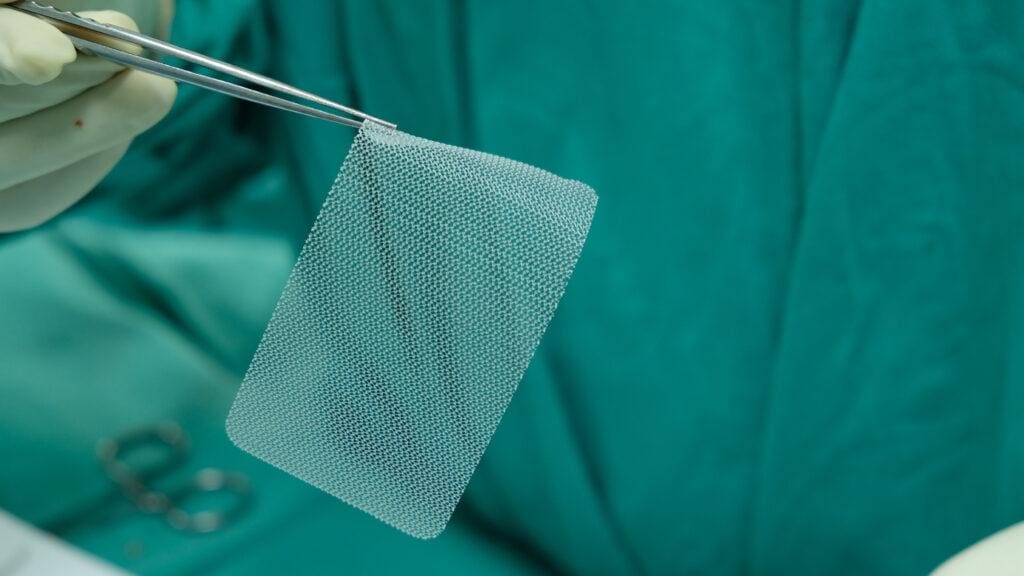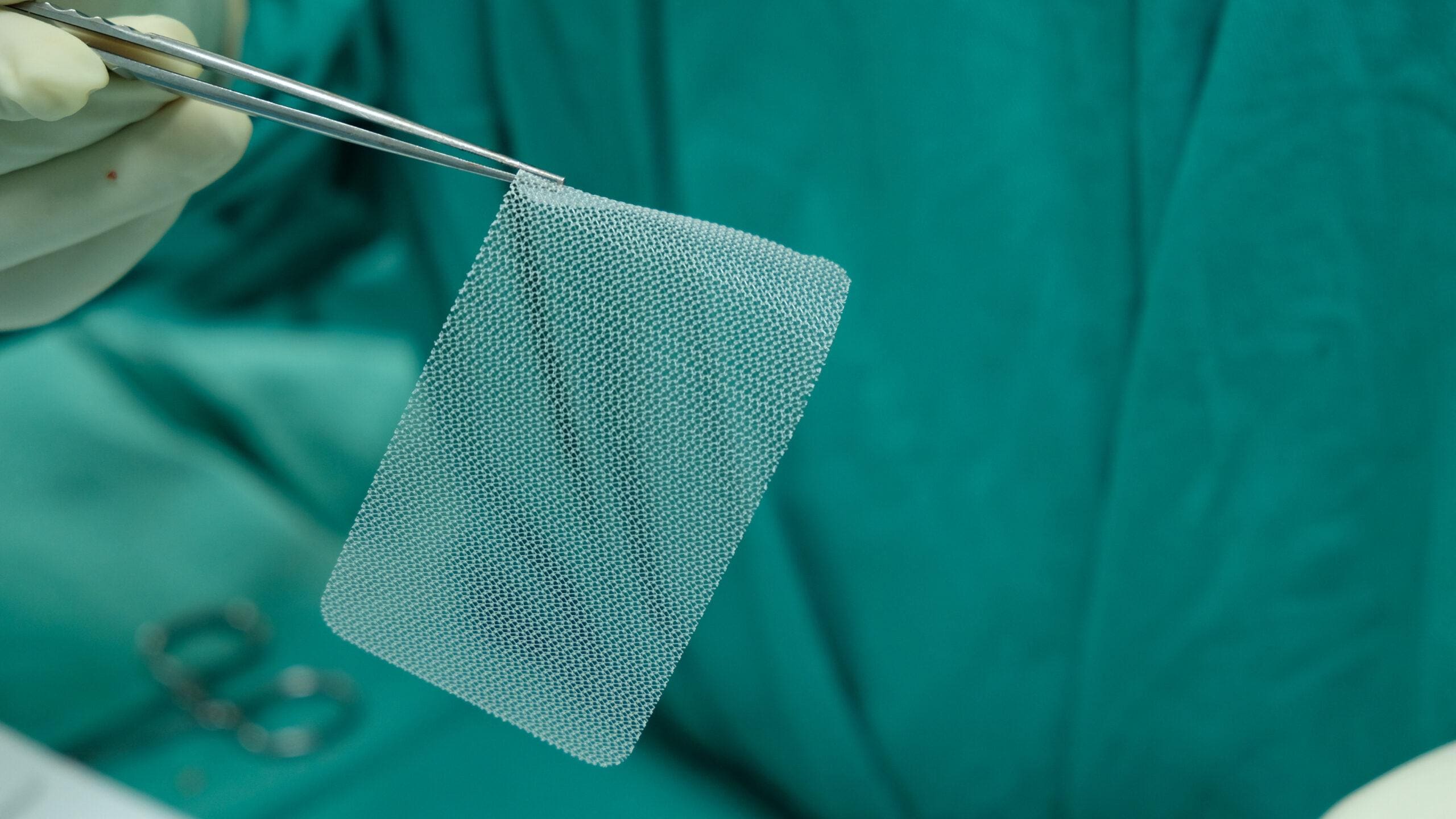Posted by : ZeroRisk Cases Marketing
Hernia mesh is a medical device meant to repair hernias. Most of the time, patients who use it don’t have problems, but severe side effects are common enough to result in tens of thousands of lawsuits. Like all defective medical devices, they may have been designed and sold with the best intentions, but the reality is they can cause far more harm than good in a significant number of people.

What is a Hernia?
A hernia happens when pressure on an organ, intestine, or fatty tissue pushes it through a hole or a weak spot in the surrounding connective tissue or muscle. The patient may be born with this weakness, or it develops later in life.
Hernias fall into several categories.
- Inguinal: In the inner groin
- Femoral: In the upper thigh/outer groin
- Incisional: Through an abdominal incision or scar
- Ventral: In the abdominal/ventral wall
- Umbilical: At the belly button
- Hiatal: Along the upper stomach/diaphragm
Anything that causes abdominal pressure can result in a hernia, such as lifting something heavy, obesity, constipation, diarrhea, persistent coughing, or sneezing. Smoking, poor nutrition, and overexertion may weaken muscles, leading to a hernia.
What is Hernia or Surgical Mesh?
It’s a surgically implanted medical device supporting damaged tissue around hernias. Surgeons put the mesh across the tissue around the hernia, attaching it with staples, stitches, or glue. Tissue grows through mesh openings. It’s estimated that more than a million hernia repairs are performed annually in the US. About 800,000 repair inguinal hernias. Hernia mesh is used in about 90% of surgeries in the country.
Most surgical meshes are made of synthetic materials or animal tissue. Synthetic mesh may be knitted or be in non-knitted sheets. The mesh is:
- Non-absorbable and a permanent reinforcement of the affected area
- Absorbable and degrades while losing strength over time
Why Do Surgeons Use Hernia Mesh?
Hernia mesh lowers the chances of a hernia recurring compared to traditional surgical approaches such as suturing torn tissue back together. Hernia mesh operations may also take less time to perform and shorten the recovery period.
What Injuries Can Result From Hernia Mesh Complications?
Hernia surgery, whether traditional or using mesh, can result in:
- Infections
- Pain
- Hernia recurrence
- Problems with scar tissue (adhesion)
- Intestinal blockage or obstruction
- Bleeding
- Abnormal connections between intestines or organs (fistula)
- Fluid build-up at the surgical site (seroma)
- A hole in neighboring tissues or organs (perforation)
The most common adverse side effects of mesh are:
- Pain
- Infections
- Hernia recurrence
- Adhesion
- Bowel obstruction
- The mesh moves or shrinks (contraction)
- Perforation
If the problem is severe enough, surgical removal of the mesh and repair of the affected area may be needed.
Hernia Mesh Lawsuits
These legal claims may allege their manufacturers committed negligence, or they’re liable under product liability law. Allegations may include the mesh is defectively designed, the defendants failed to warn physicians and or patients adequately, and the mesh is defective and dangerous even when used as intended. The surgeons involved in the procedures may also be sued for medical malpractice.
Manufacturers subject to lawsuits include:
- Gore Medical
- R. Bard
- Genzyme Corporation
- Ethicon
- Covidien
- Atrium Medical Corporation
One 2011 settlement by a defendant, C.R. Bard, was $184 million. It resolved about three thousand lawsuits. About 21,000 federal hernia mesh lawsuits are pending in three multi-district litigation (MDL) arrangements, each involving a particular defendant. About 8,000 cases are in state courts.
There will be “bellwether” trials for the MDLs involving a small number of plaintiffs. Their outcomes may set the stage for future global settlement negotiations. If the trials are successful for the plaintiffs, the cases’ value increases. If cases are dismissed, or damage awards are low, their value will be less.
Hernia Mesh Lawsuits
- They’re based on negligence and or product liability law
- Several manufacturers are defendants
- One 2011 settlement of about 3,000 cases was for $184 million
- There are about 21,000 federal lawsuits, with about 8,000 in state courts
- Federal cases are in three MDLs, each with a particular defendant
- “Bellwether” trials for a small number of MDL plaintiffs may start soon
- Their outcomes may determine future settlement amounts
ZeroRisk Cases® can reach Hernia Mesh clients ready and willing to retain your legal services. We help a limited number of law firms. Do you want to be one of them? Call us at 833-ZERORISK or fill out our online contact form for a quote.
Stop chasing dead-end internet leads and start receiving highly qualified clients.
Call 833-ZERORISK (833-937-6747) or email ma*******@***********es.com to get help with obtaining Hernia Mesh clients today.
Ed Lott, Ph.D., M.B.A.
President and Managing Partner
ZeroRisk Cases®
Call 833-ZERORISK (833-937-6747) ext 5


Recent Posts
- Valsartan Lawsuits Update 2024
- PFAS Litigation Update September 2024
- Latest Developments In Zantac Lawsuit
- EPA Cracks Down On Polyfluoroalkyl Substances PFAS
Categories
- Camp Lejeune
- Client Acquistion
- Client Financing
- Company Business
- Daily Dose of Law
- Digital Display Advertising
- Google Maps Ranking
- Human Trafficking
- Law Firm Info
- Lead Generation
- Litigation Funding
- Mass Tort News
- Mass Tort Signed Cases
- Personal Injury Leads
- Sex Abuse Cases
Archives
- September 2024
- July 2024
- June 2024
- May 2024
- April 2024
- February 2024
- January 2024
- December 2023
- November 2023
- October 2023
- September 2023
- August 2023
- July 2023
- January 2023
- December 2022
- November 2022
- October 2022
- September 2022
- August 2022
- June 2022
- May 2022
- April 2022
- March 2022
- February 2022
- January 2022
- December 2021
- November 2021
- October 2021